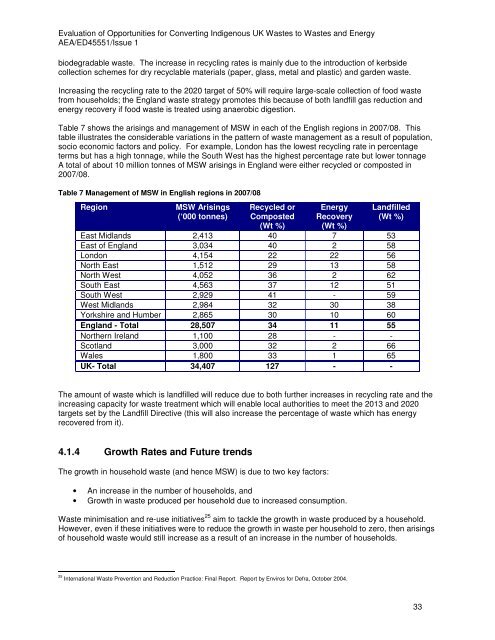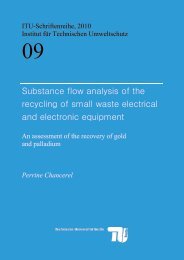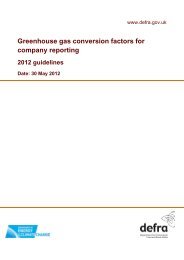to read the full report - Ecolateral by Peter Jones
to read the full report - Ecolateral by Peter Jones
to read the full report - Ecolateral by Peter Jones
You also want an ePaper? Increase the reach of your titles
YUMPU automatically turns print PDFs into web optimized ePapers that Google loves.
Evaluation of Opportunities for Converting Indigenous UK Wastes <strong>to</strong> Wastes and Energy<br />
AEA/ED45551/Issue 1<br />
biodegradable waste. The increase in recycling rates is mainly due <strong>to</strong> <strong>the</strong> introduction of kerbside<br />
collection schemes for dry recyclable materials (paper, glass, metal and plastic) and garden waste.<br />
Increasing <strong>the</strong> recycling rate <strong>to</strong> <strong>the</strong> 2020 target of 50% will require large-scale collection of food waste<br />
from households; <strong>the</strong> England waste strategy promotes this because of both landfill gas reduction and<br />
energy recovery if food waste is treated using anaerobic digestion.<br />
Table 7 shows <strong>the</strong> arisings and management of MSW in each of <strong>the</strong> English regions in 2007/08. This<br />
table illustrates <strong>the</strong> considerable variations in <strong>the</strong> pattern of waste management as a result of population,<br />
socio economic fac<strong>to</strong>rs and policy. For example, London has <strong>the</strong> lowest recycling rate in percentage<br />
terms but has a high <strong>to</strong>nnage, while <strong>the</strong> South West has <strong>the</strong> highest percentage rate but lower <strong>to</strong>nnage<br />
A <strong>to</strong>tal of about 10 million <strong>to</strong>nnes of MSW arisings in England were ei<strong>the</strong>r recycled or composted in<br />
2007/08.<br />
Table 7 Management of MSW in English regions in 2007/08<br />
Region MSW Arisings<br />
(‘000 <strong>to</strong>nnes)<br />
Recycled or<br />
Composted<br />
(Wt %)<br />
Energy<br />
Recovery<br />
(Wt %)<br />
Landfilled<br />
(Wt %)<br />
East Midlands 2,413 40 7 53<br />
East of England 3,034 40 2 58<br />
London 4,154 22 22 56<br />
North East 1,512 29 13 58<br />
North West 4,052 36 2 62<br />
South East 4,563 37 12 51<br />
South West 2,929 41 - 59<br />
West Midlands 2,984 32 30 38<br />
Yorkshire and Humber 2,865 30 10 60<br />
England - Total 28,507 34 11 55<br />
Nor<strong>the</strong>rn Ireland 1,100 28 - -<br />
Scotland 3,000 32 2 66<br />
Wales 1,800 33 1 65<br />
UK- Total 34,407 127 - -<br />
The amount of waste which is landfilled will reduce due <strong>to</strong> both fur<strong>the</strong>r increases in recycling rate and <strong>the</strong><br />
increasing capacity for waste treatment which will enable local authorities <strong>to</strong> meet <strong>the</strong> 2013 and 2020<br />
targets set <strong>by</strong> <strong>the</strong> Landfill Directive (this will also increase <strong>the</strong> percentage of waste which has energy<br />
recovered from it).<br />
4.1.4 Growth Rates and Future trends<br />
The growth in household waste (and hence MSW) is due <strong>to</strong> two key fac<strong>to</strong>rs:<br />
• An increase in <strong>the</strong> number of households, and<br />
• Growth in waste produced per household due <strong>to</strong> increased consumption.<br />
Waste minimisation and re-use initiatives 25 aim <strong>to</strong> tackle <strong>the</strong> growth in waste produced <strong>by</strong> a household.<br />
However, even if <strong>the</strong>se initiatives were <strong>to</strong> reduce <strong>the</strong> growth in waste per household <strong>to</strong> zero, <strong>the</strong>n arisings<br />
of household waste would still increase as a result of an increase in <strong>the</strong> number of households.<br />
25 International Waste Prevention and Reduction Practice: Final Report. Report <strong>by</strong> Enviros for Defra, Oc<strong>to</strong>ber 2004.<br />
33








